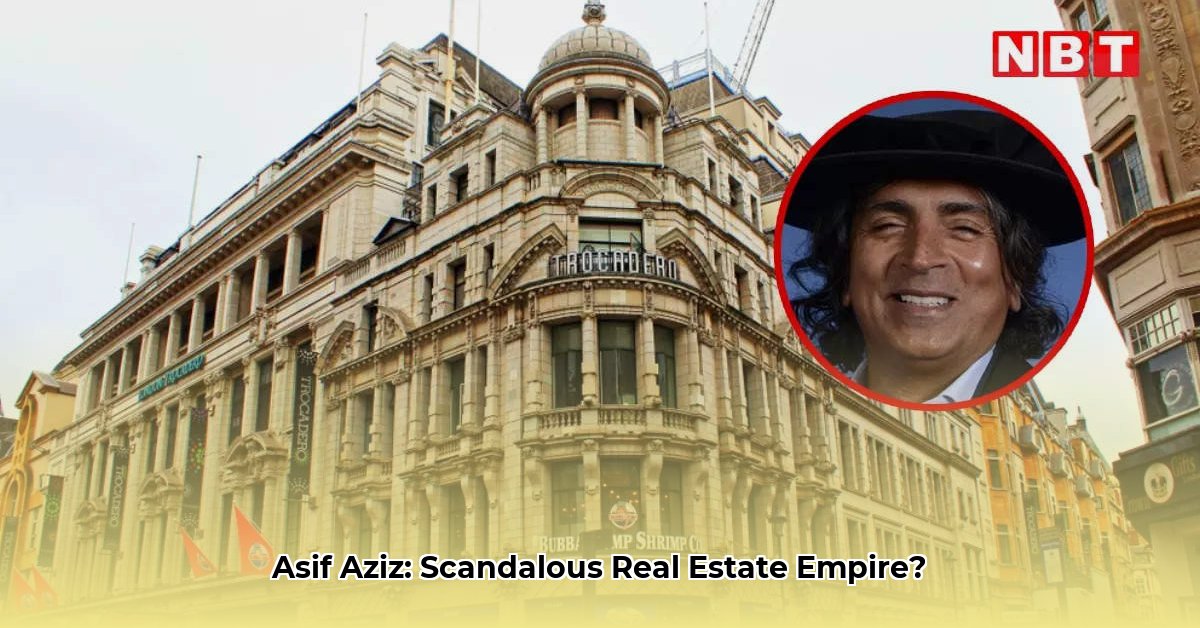
Asif Aziz's journey from relative obscurity to a prominent figure in London's real estate landscape is a complex narrative. His substantial net worth is undeniable, yet inextricably linked to significant controversies that challenge the perception of his success. This investigation delves into the multifaceted nature of his career, exploring both his entrepreneurial triumphs and the ethical questions surrounding his business practices.
The Rise of a Real Estate Empire
Aziz's path to becoming a real estate mogul wasn't straightforward. Early roles at McDonald's and Morgan Grenfell Laurie provided a foundation, fostering his drive and business acumen. The establishment of Criterion Capital marked a pivotal shift, propelling him into London's competitive property market. Strategic acquisitions of iconic properties, such as the Trocadero and the Criterion Building, showcased his ability to identify undervalued assets and maximize their potential. These weren't merely financial transactions; they were strategic maneuvers that solidified his position within the industry. But how did these acquisitions translate into such a massive net worth? The answer lies in a combination of astute business decisions, significant risk-taking, and, undeniably, controversies. How many other London real estate tycoons have faced such intense scrutiny?
Successes and Shadows: A Dual Narrative
Aziz's success is undeniable. His portfolio comprises prime London properties, each representing substantial financial gains and considerable influence. His apparent knack for spotting undervalued assets and leveraging risk has clearly paid off. However, these achievements are frequently overshadowed by persistent accusations and controversies that cast a long shadow on his rise.
Navigating Controversy: Accusations and Responses
Multiple controversies have marred Aziz's career. The protracted dispute with tenants at the Prince Charles Cinema, characterized by allegations of aggressive rent negotiations, raises serious questions about tenant treatment and fairness. Similarly, the "Dstrkt" housing projects faced criticism regarding alleged subpar living conditions despite high rental demands. These incidents highlight a potential disconnect between profit maximization and the well-being of those directly affected by his business ventures. While some may argue these are simply the realities of a competitive market, others view them as clear prioritization of profit over people. What is the true picture? The answer remains elusive.
Philanthropy and Public Image: A Balancing Act?
Aziz's philanthropic contributions are substantial. The Aziz Foundation, supporting various causes, notably within the British Muslim community, demonstrates a commitment to charitable giving through scholarships and community initiatives. Yet, the question persists: Does this generosity sufficiently counterbalance the negative publicity generated by his business practices? Can extensive charitable work truly offset perceptions of unethical conduct? The answer is nuanced and deeply subjective.
Offshore Entities and Tax Optimization: Ethical Implications
Aziz's utilization of offshore entities, notably in tax havens such as the Isle of Man, for property investments has also drawn scrutiny. While legal, such practices invite questions about ethical implications and potential tax avoidance. While minimizing tax liabilities isn't inherently illegal, it raises concerns, particularly given broader criticisms surrounding his business practices. The debate continues regarding the ethical appropriateness of such strategies, particularly considering the financial pressures faced by communities impacted by his development projects.
Redevelopment Projects and Ethical Considerations: A Balancing Act
The controversies surrounding Aziz's redevelopment projects highlight the inherent conflict between financial gain and community well-being. Discussions surrounding the potential closure of a historic landmark exemplify the tension between preserving historical significance and pursuing maximum profitability. This underscores the complex ethical considerations inherent in his approach to urban development and his legacy in shaping London's urban landscape.
Analyzing the Risks Associated with Criterion Capital
Criterion Capital faces several significant risks:
| Risk Category | Probability | Impact | Mitigation Strategy |
|---|---|---|---|
| Reputational Damage | High | High | Proactive community engagement, transparent business practices, improved tenant relations, and focused PR efforts. |
| Legal Challenges | Medium to High | High | Robust legal compliance, proactive dispute resolution, and strictly ethical business practices. Independent audits for transparency. |
| Regulatory Scrutiny | Medium | Medium | Collaboration with regulatory bodies, proactive compliance, and meticulously documented business activities. |
| Investor Backlash | Medium | Medium | Enhanced transparency, environmental and social impact reporting, and open communication with investors. |
This risk assessment offers a current snapshot. Future investigations may refine this analysis.
Asif Aziz's Legacy: An Unfinished Narrative
Asif Aziz's story is complex and multifaceted. His entrepreneurial skills and business acumen are undeniable. However, the controversies surrounding his practices continue to fuel intense debate regarding his overall impact. While his philanthropic contributions are significant, they don't necessarily negate the ethical concerns associated with his business methods. Ultimately, forming a conclusive judgment on Aziz and his legacy remains a matter of personal interpretation; the evidence is complex and often conflicting. The ongoing scrutiny of his business dealings suggests his story is far from complete.